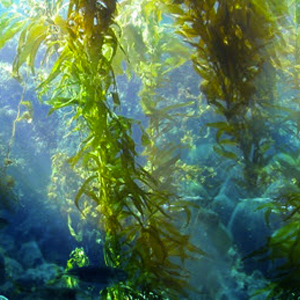Bladderwrack (Fucus vesiculosus) is a form of kelp that has been used medicinally for centuries. Bladderwrack has been used for underactive thyroid (myxedema), over-sized thyroid gland (goiter), and iodine deficiency. It has also been used for boosting the immune system and increasing energy, obesity, arthritis, joint pain, arteriosclerosis, digestive disorders, heartburn, constipation, bronchitis, emphysema, urinary tract disorders, and anxiety(1).
The main use of the herb has been for the stimulation of the thyroid gland as a treatment for obesity and cellulite. The high iodine content of the herb stimulates thyroid function, which boosts metabolism. Iodine is an essential trace element for synthesis of thyroid hormones and normal brain development. One study found that administration of iodine in the form of powdered kelp restored thyroid function and urinary iodine concentrations in seven children with hypothyroidism(8).
Diet-related risk factors leading to premature death from cardiovascular diseases (CVDs) in humans include obesity, hypertension, endothelial dysfunction, diabetes, and disproportionate cellular free-radical production(4). Bladderwrack contains fucoidan, a complex polysaccharide found in many species of brown seaweed. In vitro studies have shown fucoidan to have antitumor, antiangiogenic, antiviral, anti-arthritic, and immunomodulatory effects(5). Fucoidan also exhibited neuroprotective, radioprotective, and antiulcer properties5. Fucoidan has exhibited antifibrotic and anti-inflammatory effects on alcohol-induced liver damage in mice(3). One study found fucoidan may be useful for the prevention or treatment of obesity due to its stimulatory lipolysis(6). Diabetic patients are at high risk of endothelial dysfunction and vascular lesions, because of multiple harmful stimuli, such as hyperglycemia, hyperlipidemia, and oxidative stress. These patients are susceptible to atherosclerosis, hypertension, and peripheral vascular disease. Fucoidan was found to protect vasoendothelial function and reduced basal blood pressure in type 2 diabetes rats(7).
Pancreatic cancer is one of the most aggressive cancer entities, with an overall five-year survival rate of 7.2%, and the only curative treatment option being limited to less than 20% of the patients. Treatment with Fucus vesiculosus resulted in a strong inhibition of viability in various pancreatic cancer cell lines and low cytotoxic activity against non-malignant resting T cells and terminally differentiated cells like erythrocytes(2). Another studies results suggested fucus vesiculosus extract may provide a beneficial protective effect against estrogen-dependent breast, endometrial and ovarian cancers, and may be useful in the treatment of some breast, endometrial and ovarian cancers(9).
General:
1)WebMD. Find a Vitamin or Supplement: BLADDERWRACK. 2005-2016. http://www.webmd.com/vitamins-supplements/ingredientmono-726-bladderwrack.aspx?activeIngredientId=726&activeIngredientName=bladderwrack&source=1&tabno=2
Fucoidan:
5)Memorial Sloan Kettering Cancer Center. Fucoidan. 2016. https://www.mskcc.org/cancer-care/integrative-medicine/herbs/fucoidan
6)Park, M. K., Jung, U., & Roh, C. (2011b). Fucoidan from marine brown algae inhibits lipid accumulation. Marine Drugs, 9, 1359–1367. http://www.ncbi.nlm.nih.gov/pmc/articles/PMC3164378/pdf/marinedrugs-09-01359.pdf
7)Cui W, Zheng Y, Zhang Q, Wang J, Wang L, Yang W, Guo C, Gao W, Wang X, Luo D. Low-molecular-weight fucoidan protects endothelial function and ameliorates basal hypertension in diabetic Goto-Kakizaki rats. Laboratory Investigation. 2014 Apr 1;94(4):382-93. http://www.nature.com/labinvest/journal/v94/n4/full/labinvest201412a.html
Thyroid:
8)Takeuchi T, Kamasaki H, Hotsubo T, Tsutsumi H. Treatment of hypothyroidism due to iodine deficiency using daily powdered kelp in patients receiving long-term total enteral nutrition. Clinical Pediatric Endocrinology. 2011 Jul;20(3):51. http://www.ncbi.nlm.nih.gov/pmc/articles/PMC3687637/
Cardiovascular:
4)Cornish ML, Critchley AT, Mouritsen OG. A role for dietary macroalgae in the amelioration of certain risk factors associated with cardiovascular disease. Phycologia. 2015 Nov 16;54(6):649-66. http://www.academia.edu/download/41058398/CVD_Publication_in_Phycologia.pdf
Liver:
3)Lim JD, Lee SR, Kim T, Jang SA, Kang SC, Koo HJ, Sohn E, Bak JP, Namkoong S, Kim HK, Song IS. Fucoidan from fucus vesiculosus protects against alcohol-induced liver damage by modulating inflammatory mediators in mice and hepg2 cells. Marine drugs. 2015 Feb 16;13(2):1051-67. http://www.mdpi.com/1660-3397/13/2/1051/htm
Cancer:
2)Geisen U, Zenthoefer M, Peipp M, Kerber J, Plenge J, Managò A, Fuhrmann M, Geyer R, Hennig S, Adam D, Piker L. Molecular mechanisms by which a Fucus vesiculosus extract mediates cell cycle inhibition and cell death in pancreatic cancer cells. Marine drugs. 2015 Jul 20;13(7):4470-91. http://www.mdpi.com/1660-3397/13/7/4470/htm
9)Zhang J, Riby JE, Conde L, Grizzle WE, Cui X, Skibola CF. A Fucus vesiculosus extract inhibits estrogen receptor activation and induces cell death in female cancer cell lines. BMC complementary and alternative medicine. 2016 May 28;16(1):1. https://bmccomplementalternmed.biomedcentral.com/articles/10.1186/s12906-016-1129-6
